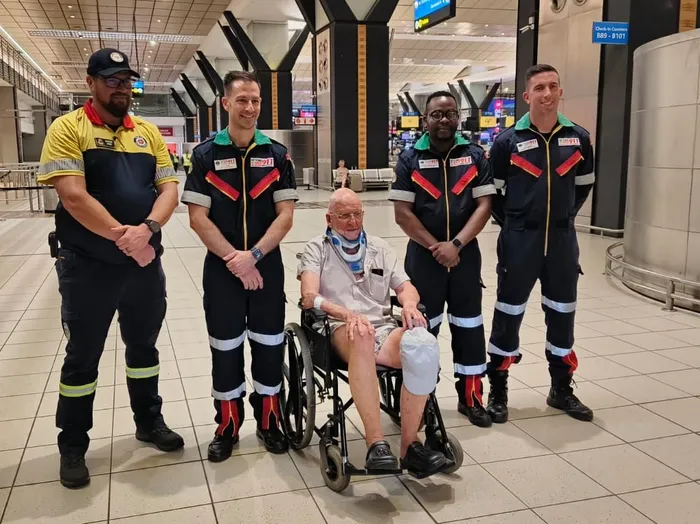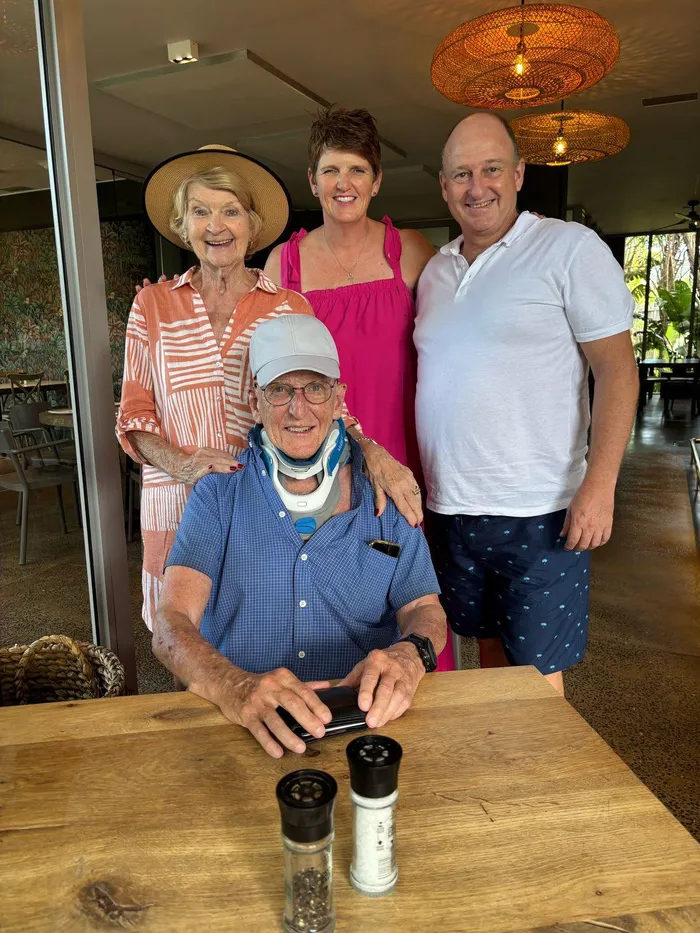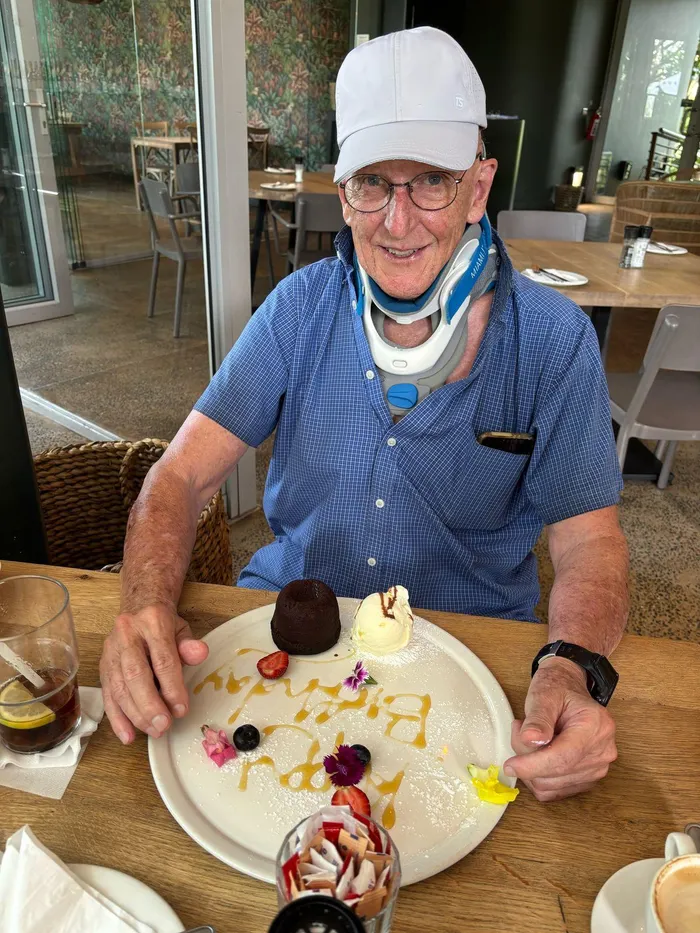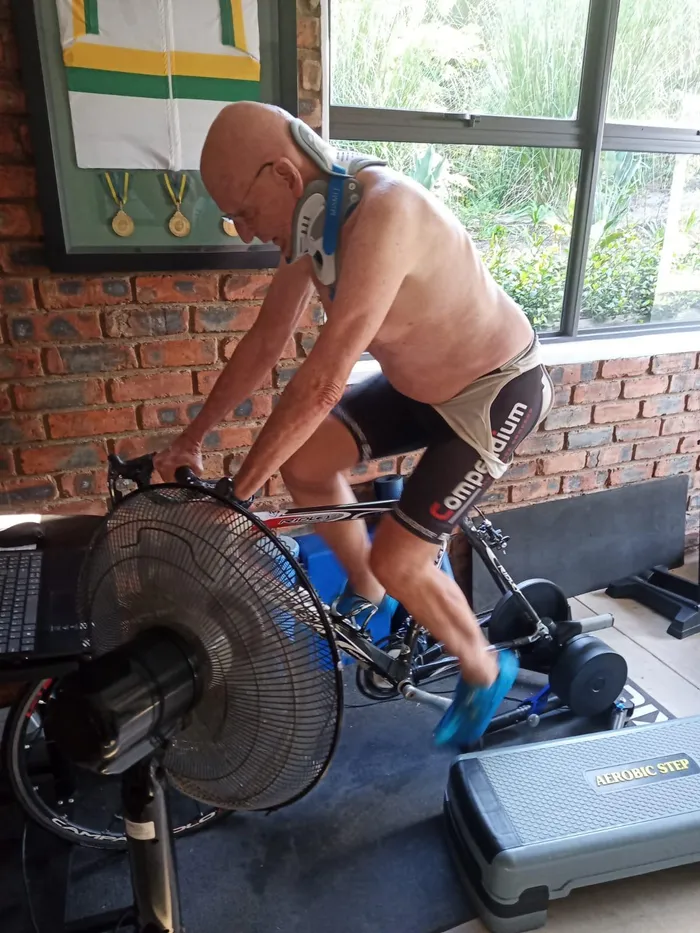The critical role of helmets: Roger Rennie's journey after a serious cycling accident

Ballito resident Roger Rennie sustained a serious injury in a cycling accident while competing in an event in Johannesburg. First responders, Netcare 911’s Kyle Shiel, Nick Berry and Vhuthu Raphalalani as well as Wayne Kruger of SARZA, bid him farewell at the airport when he was discharged from Netcare Alberton Hospital after surgery and was well enough to travel home to KwaZulu-Natal.
Image: Supplied
Roger Rennie, an active cycling enthusiast from Ballito, KwaZulu-Natal, has a renewed perspective on life after enduring a traumatic accident that left him with two fractured vertebrae. With over 40 years of cycling experience, Rennie was well aware of the risks, but a recent national cycle race in Johannesburg turned his life upside down. Now, he wants to share his story to underscore the vital importance of wearing quality helmets while cycling.
On the day of the accident, Rennie had travelled from Ballito to participate in a critical time trial. Little did he know, he would soon be lying on the ground, facing severe neck pain and the reality of a serious injury. Paramedics from Netcare 911, including advanced life support medic Kyle Shiel along with colleagues Nick Berry and Vhuthu Raphalalani, were quick to respond and efficiently administered care on scene.
“When we first assessed Roger, he was in significant pain and had a history of breaking his neck earlier in life,” Shiel recounted. “Knowing this, we had to proceed with extreme caution. We used spinal motion protection protocols, as Roger’s injuries could have resulted in catastrophic outcomes.”

Recovering back home, Roger is pictured with his wife, Ann Rennie, his daughter Shannon Berriman and son-in-law Brett Berriman. The family expressed their gratitude to Netcare 911, and the medical team at Netcare Alberton Hospital, including neurosurgeon Dr Tommy Mbuyane, trauma surgeon Dr Naadiyah Laher and intensive care specialist Dr Sooraj Motilall.
Image: Supplied
Remarkably, the helmet that Rennie was wearing bore clear signs of impact. “The damage to the helmet indicated the significant force involved in the accident. Without it, the injuries could have been far worse, leading to major head trauma,” Shiel added. With stable vitals, Rennie was carefully transported to the level 1 trauma centre at Netcare Alberton Hospital.
The Rennie family, anxiously awaiting news, received the distressing call about Roger’s condition. His daughter, Shannon Berriman, recalled their helplessness: “We felt so desperate, not knowing what had happened. Prayers were all we had until we heard from Dad himself after he had been assessed.”
Upon arrival at the hospital, trauma surgeon Dr Naadiyah Laher quickly stabilised Roger, preparing him for emergency surgery due to a haematoma pressing on his spinal cord. “Mr Rennie presented with complex fractures and dislocation of the C1 and C2 vertebrae,” Dr Mbuyane explained. “The situation was further complicated by kyphosis and the haemorrhage risking paralysis.”

Specialists and paramedics note that Roger Rennie’s survival is largely attributable to the fact that he was wearing a bicycle helmet. Celebrating his 78th birthday shortly after his ordeal, Roger urges all cyclists to consistently wear a quality, properly fitting helmet to protect against head injuries.
Image: Supplied
Alarmed by the potential long-term consequences, doctors informed the family that Roger might never walk again. Yet, after a successful eight-hour surgery, hope flickered when he emerged from an induced coma able to move and feel his limbs.
“It is remarkable that Roger survived with his faculties intact, thanks to his helmet and the quick actions of the first responders,” Dr Mbuyane emphasised. A week later, he was discharged and met by the supportive Netcare 911 crew and Wayne Kruger from SARZA Search and Rescue at the airport.
Now, with his 78th birthday recently celebrated back at home, Roger finds himself eager to convey a crucial message: “Cyclists need to prioritise safety. Always wear a good quality, well-fitting helmet. My experience shows just how critical that can be.”

Although his road cycling days are now behind him, Roger Rennie is still keeping fit and active by training on an indoor cycle.
Image: Supplied
Hoping to prevent similar incidents, advanced life support medic Kyle Shiel offers these essential safety tips:
- Always wear appropriate protective gear, including a helmet.
- Ensure your helmet fits snugly and is correctly fastened.
- Remember that helmets are designed for a single impact; replace yours even if there's no visible damage.
- Whenever possible, ride with a buddy and carry your medical information.
Shiel also stressed the importance of first aid protocols for suspected spinal injuries: “If you encounter someone who may have a spinal injury, do not move them unless they are in imminent danger. Call emergency services and keep the person steady and calm until help arrives.”
Related Topics:
